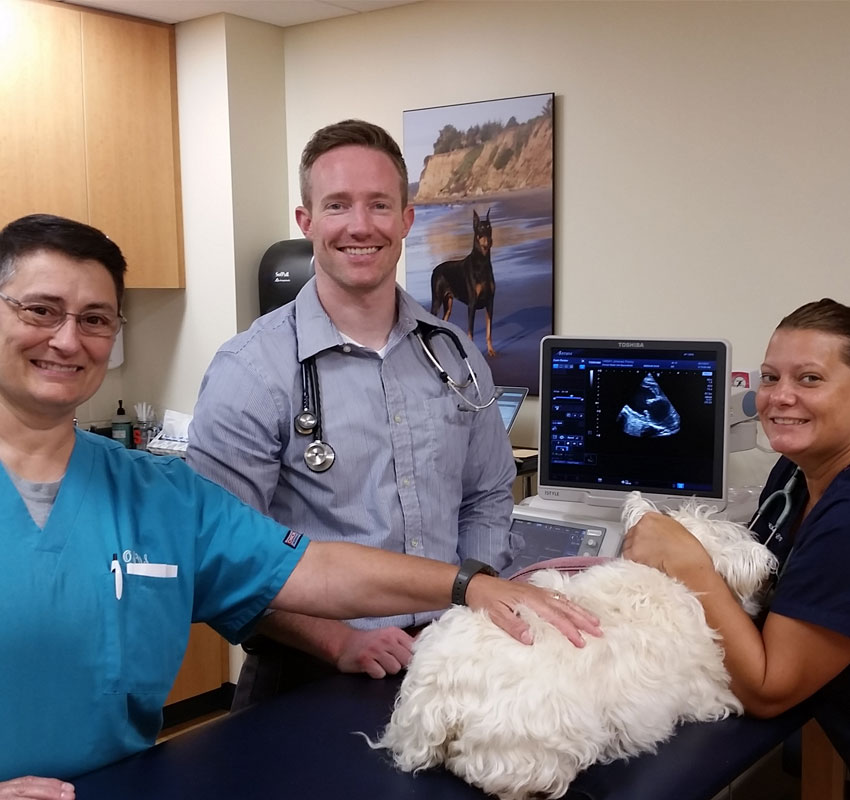Exploring the Essential Services Offered by a Veterinary Cardiologist: Comprehending Ultrasound and CT Check Strategies
Veterinary cardiologists play an important role in the health of pets by identifying and dealing with various heart conditions. They utilize innovative imaging strategies, such as cardiac ultrasound and CT scans, to offer precise examinations. Each approach has its distinct benefits and applications. Comprehending these strategies is necessary for pet dog owners looking for the most effective take care of their companions. What factors should pet proprietors consider when picking in between these analysis tools?

The Function of Veterinary Cardiologists in Family Pet Medical Care
Veterinary cardiologists play a crucial duty in the health care of family pets, concentrating specifically on detecting and treating heart-related problems. They possess specialized training that permits them to interpret complicated diagnostic examinations and determine various cardio problems. These specialists utilize advanced methods, such as echocardiography and electrocardiography, to evaluate heart function and structure accurately.Veterinary cardiologists additionally create customized therapy strategies that might include medicines, lifestyle alterations, and, sometimes, surgical interventions. Their competence expands to enlightening animal proprietors concerning heart health, emphasizing the value of regular check-ups and very early discovery of prospective troubles. Partnership with general veterinarians is crucial, as it guarantees complete treatment for pets with suspected cardiac concerns. By providing specialized solutions, veterinary cardiologists considerably improve the quality of life for pets and offer assurance for their owners, strengthening the value of heart health in overall pet health.
Common Heart Issues in Family Pets
Common cardiac issues in family pets can greatly impact their health and lifestyle. Heart whisperings, different sorts of cardiomyopathy, and congenital heart issues are amongst the most prevalent problems that vets experience. Ultrasound For Dogs. Understanding these problems is important for pet dog owners to ensure prompt medical diagnosis and appropriate treatment
Heart Murmurs in Pets
Although heart whisperings can be a source of issue for pet owners, they are not always a measure of serious health problems. A heart whispering is an uncommon audio produced by rough blood flow within the heart. In family pets, these murmurs can be triggered by various aspects, including genetic heart problems, valve problems, or perhaps stress during assessments. Numerous pets with heart whisperings lead normal lives without considerable wellness impacts. To identify the underlying reason, vet cardiologists typically use diagnostic methods such as echocardiograms and Doppler ultrasounds. Early discovery and analysis are essential, as they may aid manage any type of potential cardiac issues efficiently. Animal owners are motivated to consult their veterinarian for an extensive examination if a heart murmur is spotted.
Cardiomyopathy Kind Explained
Cardiomyopathy includes a team of diseases influencing the heart muscular tissue, bring about endangered cardiac feature in pets. The most common types include dilated cardiomyopathy (DCM), hypertrophic cardiomyopathy (HCM), and limiting cardiomyopathy (RCM) DCM primarily affects pet dogs, causing the heart to deteriorate and expand, which lessens its capacity to pump blood successfully. On the other hand, HCM is a lot more common in cats, identified by the thickening of the heart wall surfaces, frequently leading to blocked blood circulation. RCM, though much less common, occurs when the heart muscle mass becomes rigid, limiting its ability to full of blood. Each type offers unique obstacles in diagnosis and therapy, necessitating specialized vet cardiological analysis to guarantee peak administration and take care of affected family pets.
Congenital Heart Defects
Hereditary heart defects represent a substantial group of heart concerns in animals, distinct from acquired conditions such as cardiomyopathy - Board Certified Veterinary Cardiologist. These flaws are structural irregularities existing at birth, impacting the heart's regular function. Usual types include patent ductus arteriosus, ventricular septal defects, and pulmonic constriction. Symptoms may vary extensively, varying from moderate to severe, and can include exercise intolerance, coughing, and trouble breathing. Early medical diagnosis via innovative imaging techniques like ultrasound is vital for efficient administration. Veterinary cardiologists play an important function in recognizing these problems and recommending suitable treatment alternatives, which might include medical management or surgical treatment. Recognizing genetic heart defects permits better outcomes and boosted high quality of life for impacted animals
Recognizing Cardiac Ultrasound: How It Works
A substantial number of veterinary methods now utilize cardiac ultrasound as a crucial diagnostic device for assessing heart health in animals. This non-invasive technique uses high-frequency acoustic waves to create pictures of the heart's structure and function. Throughout the treatment, a vet professional applies a gel to the pet's upper body and uses a transducer to release ultrasound waves. These waves bounce off the heart and bordering frameworks, producing real-time images on a monitor.Veterinarians can evaluate numerous elements of heart wellness, including chamber dimension, wall surface activity, and valve feature. Additionally, heart ultrasound enables the discovery of irregularities such as liquid accumulation and hereditary heart issues. This technique is crucial for detecting problems that may not be noticeable with typical radiographs. By supplying comprehensive info regarding the heart's anatomy and efficiency, heart ultrasound click for source help in formulating reliable treatment plans for pets struggling with cardiovascular disease.
The Relevance of CT Checks in Identifying Heart Issues
Exactly how do CT scans enhance the medical diagnosis of heart problems in vet medication? CT scans offer in-depth cross-sectional photos of the heart and bordering frameworks, permitting veterinarians to envision complex physiological partnerships. This imaging technique is particularly valuable in identifying hereditary heart issues, heart tumors, and irregularities in blood vessels. By using sophisticated imaging formulas, CT scans can evaluate heart chamber dimensions and feature, providing a complete view that might be challenging to accomplish with standard methods.Additionally, CT angiography can imagine blood circulation and identify locations of constriction or obstruction, which is vital for planning possible interventions. The rate and precision of CT scans also help with quick medical diagnoses, essential in emergency situation circumstances. Ultimately, the unification of CT checks right into veterinary cardiology considerably boosts the accuracy of diagnoses, making it possible for targeted therapy strategies and boosting client end results for animals suffering from heart conditions.
Comparing Ultrasound and CT Check Techniques
While both ultrasound and CT scans are vital devices in vet cardiology, they use distinctive advantages and constraints that influence their usage in detecting heart find out this here problems. Ultrasound, or echocardiography, supplies real-time imaging of the heart's structure and feature, enabling veterinarians to examine heart chambers, shutoffs, and blood circulation. It is especially efficient for examining problems like coronary infarction and cardiomyopathy. Nonetheless, ultrasound may be limited in envisioning particular physiological structures because of patient dimension or obesity.In contrast, CT checks offer detailed cross-sectional photos of the heart and bordering cells, making them excellent for identifying architectural problems, tumors, or vascular issues. CT scans supply comprehensive understandings, they need sedation and may include radiation exposure. Inevitably, the selection in between ultrasound and CT scans depends on the certain professional scenario, the person's problem, and the information required for a precise diagnosis.
Treatment Options Available Through Vet Cardiology
Vet cardiology offers a variety of therapy choices customized to deal with numerous heart problems in pets. Therapy plans frequently begin with way of living alterations, consisting of diet regimen changes and exercise adjustments, targeted at enhancing overall heart health and wellness. Medicines play an essential function, with cardiologists recommending drugs such as diuretics, beta-blockers, and ACE inhibitors to improve and take care of signs and symptoms cardiac function.In extra serious situations, interventional procedures, such as balloon valvuloplasty or stent placement, might be needed to relieve blockages or boost blood circulation. For sure genetic heart problems, surgical alternatives might be discovered to fix architectural issues. In addition, ongoing surveillance and follow-up care are necessary components of an extensive treatment strategy, permitting timely changes based upon the animal's feedback to treatment. In general, vet cardiology concentrates on supplying reliable, customized care to maximize the health and health of pet patients with heart conditions.
How to Prepare Your Pet for a Cardiac Assessment
Preparing a pet dog for a cardiac analysis is vital to ensure precise results and a smooth procedure. Proprietors ought to initially schedule the appointment with the veterinary cardiologist and go over any kind of specific demands or problems. It is recommended to hold back food for at least 12 hours before the evaluation, as this assists improve imaging high quality during procedures like ultrasound or CT scans.Additionally, preserving a tranquil setting on the day of the appointment can help in reducing the animal's anxiety. It is beneficial to bring along any kind of pertinent clinical records, including previous tests and drugs (Cancer Veterinary Near Me). Proprietors must also ensure that their pet dog fits and leashed during transportation to the clinic. Finally, acquainting themselves with the analysis process can assist and ease concerns in asking notified inquiries during the assessment. By adhering to these steps, proprietors can add considerably to the performance of the heart evaluation
Frequently Asked Questions
For how long Does a Cardiac Ultrasound or CT Scan Take?
The duration of a cardiac ultrasound generally ranges from 30 to 60 mins, while a CT check may take approximately 15 to thirty minutes. Elements such as the person's problem can influence these time estimates.

Exist Any Kind Of Threats Connected With These Analysis Treatments?

Can I Remain With My Animal Throughout the Treatment?
The veterinary center's plan typically dictates whether pet owners can stay during procedures. While some centers encourage owner visibility for convenience, others might call for separation to assure security and ideal conditions for analysis imaging.
Just how much Do These Analysis Examinations Generally Expense?
The expenses of analysis examinations, such as ultrasound and CT scans, generally vary based on location and center. Usually, rates range from a couple of hundred to over a thousand bucks, reflecting the intricacy and technology involved.
What Is the Healing Process After a Cardiac Assessment?
The recovery procedure after a heart assessment involves monitoring the family pet for any prompt reactions, guaranteeing comfort, and limiting physical task. Vets generally supply post-evaluation directions to lead animal owners throughout this vital healing period. Heart whisperings, different kinds of cardiomyopathy, and hereditary heart problems are among the most prevalent problems that veterinarians experience. A heart whispering is an uncommon sound generated by stormy blood circulation within the heart. Cardiomyopathy encompasses a team of diseases influencing the heart muscle, leading to endangered heart function in pets. Genetic heart defects represent a considerable category of cardiac issues in family pets, distinct from obtained problems such go to my site as cardiomyopathy. Ultrasound, or echocardiography, offers real-time imaging of the heart's framework and function, enabling vets to examine heart chambers, shutoffs, and blood flow.